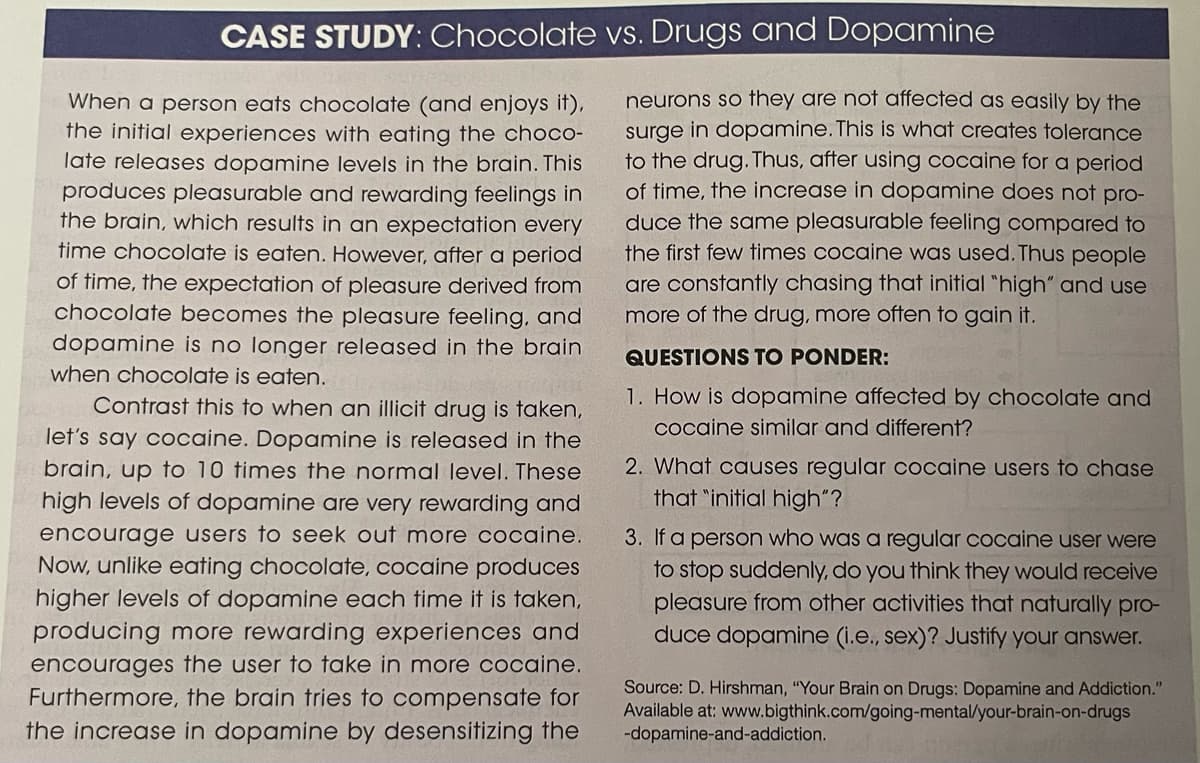Chapter13: Nerves Of Steel
Section: Chapter Questions
Problem 6CTE
Related questions
Question
100%
What causes regular cocaine users to chose that "initial high"?

Transcribed Image Text:CASE STUDY: Chocolate vs. Drugs and Dopamine
When a person eats chocolate (and enjoys it),
the initial experiences with eating the choco-
late releases dopamine levels in the brain. This
produces pleasurable and rewarding feelings in
the brain, which results in an expectation every
time chocolate is eaten. However, after a period
of time, the expectation of pleasure derived from
chocolate becomes the pleasure feeling, and
dopamine is no longer released in the brain
when chocolate is eaten.
Contrast this to when an illicit drug is taken,
let's say cocaine. Dopamine is released in the
brain, up to 10 times the normal level. These
high levels of dopamine are very rewarding and
encourage users to seek out more cocaine.
Now, unlike eating chocolate, cocaine produces
higher levels of dopamine each time it is taken,
producing more rewarding experiences and
encourages the user to take in more cocaine.
Furthermore, the brain tries to compensate for
the increase in dopamine by desensitizing the
neurons so they are not affected as easily by the
surge in dopamine. This is what creates tolerance
to the drug. Thus, after using cocaine for a period
of time, the increase in dopamine does not pro-
duce the same pleasurable feeling compared to
the first few times cocaine was used. Thus people
are constantly chasing that initial "high" and use
more of the drug, more often to gain it.
QUESTIONS TO PONDER:
1. How is dopamine affected by chocolate and
cocaine similar and different?
2. What causes regular cocaine users to chase
that "initial high"?
3. If a person who was a regular cocaine user were
to stop suddenly, do you think they would receive
pleasure from other activities that naturally pro-
duce dopamine (i.e., sex)? Justify your answer.
Source: D. Hirshman, "Your Brain on Drugs: Dopamine and Addiction."
Available at: www.bigthink.com/going-mental/your-brain-on-drugs
-dopamine-and-addiction.
Expert Solution
This question has been solved!
Explore an expertly crafted, step-by-step solution for a thorough understanding of key concepts.
Step by step
Solved in 2 steps

Knowledge Booster
Learn more about
Need a deep-dive on the concept behind this application? Look no further. Learn more about this topic, biology and related others by exploring similar questions and additional content below.Recommended textbooks for you


Essentials of Pharmacology for Health Professions
Nursing
ISBN:
9781305441620
Author:
WOODROW
Publisher:
Cengage

Biology (MindTap Course List)
Biology
ISBN:
9781337392938
Author:
Eldra Solomon, Charles Martin, Diana W. Martin, Linda R. Berg
Publisher:
Cengage Learning


Essentials of Pharmacology for Health Professions
Nursing
ISBN:
9781305441620
Author:
WOODROW
Publisher:
Cengage

Biology (MindTap Course List)
Biology
ISBN:
9781337392938
Author:
Eldra Solomon, Charles Martin, Diana W. Martin, Linda R. Berg
Publisher:
Cengage Learning

Human Physiology: From Cells to Systems (MindTap …
Biology
ISBN:
9781285866932
Author:
Lauralee Sherwood
Publisher:
Cengage Learning